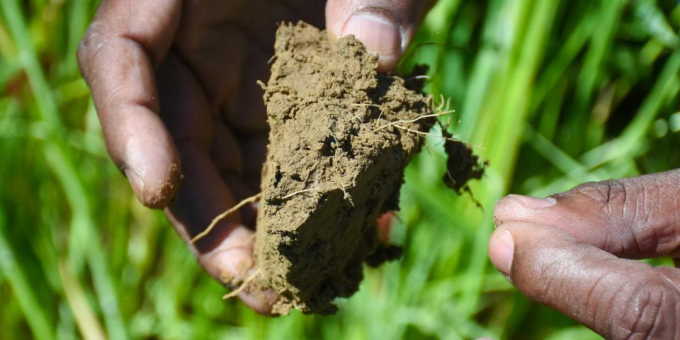
INDIANA – The U.S. Department of Agriculture (USDA) is investing $8 million in four partnerships to support and expand the measurement and monitoring of carbon in soil on working agricultural lands and to assess how climate-smart practices are affecting carbon sequestration.
USDA’s Natural Resources Conservation Service (NRCS) will work with Iowa State University, Michigan State University, American Climate Partners, and the University of Texas at El Paso on regional projects on soil organic carbon stock monitoring.
The selected partners will support the implementation of a new Conservation Evaluation and Monitoring Activity (CEMA) offered by NRCS, which provides financial assistance to producers for measuring soil organic carbon stocks before and after the implementation of a conservation practice or conservation plan. A qualified individual will use a hydraulic probe or excavation method to sample soil to a one-meter depth or restrictive layer. The soil will then be tested for organic carbon and bulk density to provide organic carbon stock levels to farmers and ranchers. These partners will play a critical role in training individuals on the sampling methodology and informing producers about the CEMA opportunity.

“Healthy soils are a powerful tool when it comes to sequestering carbon. These partners will enhance our measurement tools and eventually become part of our program delivery to advance quantification of the effects that climate-smart agricultural practices have on carbon sequestration,” NRCS Chief Terry Cosby said. “Soil health management practices and activities are a tremendous part of our strategy when it comes to climate-smart agriculture and forestry.”
NRCS is funding four regional agreements:
- Iowa State University of Science and Technology – Know Your Carbon Landscape: Data for Consistent Monitoring of Soil Carbon: This $1.99 million four-year project in NRCS’ Central Region will be conducted by an eclectic team of university educators, USDA’s Agricultural Research Service (ARS) researchers and stakeholders who will design materials and deliver training on NRCS’s Soil Organic Carbon (SOC) Stock Measurement standards and the benefits of monitoring SOC stocks using a three-prong approach: website, printed materials, and field demonstration sites.
- Michigan State University – Soil Carbon IDEA: Inclusion, Diversity, Equity, and Access in highly diverse cropping systems and people in the Northeast U.S.: The objective of this $1.95 million four-year project in NRCS’ Northeast Region is to develop comprehensive training in SOC evaluation for diverse groups of farmers, agronomists, and agribusiness professionals. The training will include field days, bulletins, videos, a podcast, and a film documentary.
- American Climate Partners – Southeast Region Deep Soil Carbon Stock Partnership and Monitoring Project: This $2 million four-year project in NRCS’ Southeast Region will support and increase soil carbon stock monitoring through a public-private partnership between American Climate Partners, land-grant universities and their extension services, Carter Farms, LLC in Orange County Virginia and other organizations providing technical assistance to historically underserved communities. The goal of the project is to train producers on how to assess and monitor the effects of climate-smart practices on soil carbon sequestration and on the benefits of these practices.
- University of Texas at El Paso – Dynamic Carbon SMART (Soil Monitoring, Assessment, Research, and Training) Project: This $2 million, four-year project in NRCS’ Western Region will train producers to quantify soil carbon stocks and assess the efficacy of climate-smart conservation practices. The project will facilitate regional capacity-building by recruiting and training local technical service providers and qualified individuals who can effectively recruit underserved producers to participate in NRCS financial and technical assistance for Soil Organic Carbon Stock Monitoring.
All the selected projects include a strategy to reach equity in program delivery in underserved communities by encouraging diverse producers to participate in soil carbon monitoring and other NRCS conservation activities. Project partners will deliver training on soil sampling for soil organic carbon and bulk density, data collection, management, and processing methods, and conduct outreach to producers to encourage the use of NRCS’ soil carbon monitoring activity.
This work will complement existing soil carbon monitoring efforts at USDA, including USDA’s Farm Service Agency (FSA) investment of $10 million in its Monitoring, Assessment, and Evaluation effort to sample, measure and monitor soil carbon on Conservation Reserve Program (CRP) acres to better quantify the climate outcomes of the program. Both CEMAs and the CRP MAE effort will contribute to a larger USDA measurement, monitoring, reporting, and verification (MMRV) strategy to improve the climate outcomes of USDA programs and enhance USDA’s greenhouse gas (GHG) accounting for the agriculture and forestry sectors at the national, programmatic, and field scales. This strategy also includes new investments in quantification under the Inflation Reduction Act [including to support a National Soil Carbon Monitoring Network] and MMRV efforts within Partnerships for Climate Smart Commodities projects, all of which will continue to support the broader goals of USDA’s GHG Inventory and Assessment Program and wider MMRV work.
Today’s announcement reflects the goals of President Biden’s Investing in America agenda, which is growing the American economy from the bottom up and middle out – from rebuilding our nation’s infrastructure to driving over $470 billion in private sector manufacturing and clean energy investments in the United States, to creating good paying jobs and building a clean-energy economy that will combat climate change and make our communities more resilient.
More Information
USDA touches the lives of all Americans each day in so many positive ways. In the Biden-Harris administration, USDA is transforming America’s food system with a greater focus on more resilient local and regional food production, fairer markets for all producers, ensuring access to safe, healthy, and nutritious food in all communities, building new markets and streams of income for farmers and producers using climate-smart food and forestry practices, making historic investments in infrastructure and clean energy capabilities in rural America, and committing to equity across the Department by removing systemic barriers and building a workforce more representative of America. To learn more, visit usda.gov.




